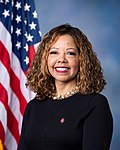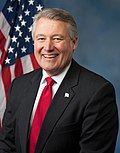A request that this article title be changed to Georgia's congressional delegations is under discussion . Please do not move this article until the discussion is closed. |
Georgia became a U.S. state in 1788, which allowed it to send congressional delegations to the United States Senate and United States House of Representatives beginning with the 1st United States Congress in 1789. Each state elects two senators to serve for six years, and members of the House to two-year terms.
Contents
- Current delegation
- United States Senate
- United States House of Representatives
- 1789–1793: 3 districts
- 1793–1827: at-large seats
- 1827–1829: 7 districts
- 1829–1845: at-large seats
- 1845–1863: 8 districts
- 1863–1873: 7 districts
- 1873–1883: 9 districts
- 1883–1893: 10 districts
- 1893–1913: 11 districts
- 1913–1933: 12 districts
- 1933–1993: 10 districts
- 1993–2003: 11 districts
- 2003–2013: 13 districts
- 2013–present: 14 districts
- Key
- See also
- Notes
- References
These are tables of congressional delegations from Georgia to the United States Senate and the United States House of Representatives.




























